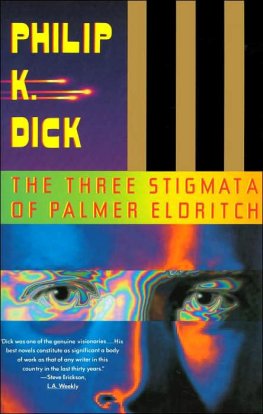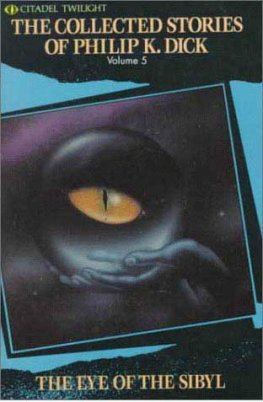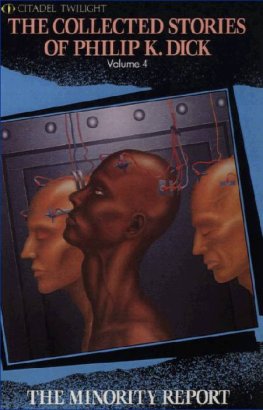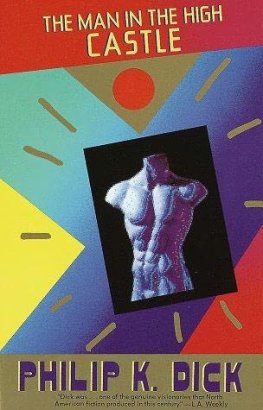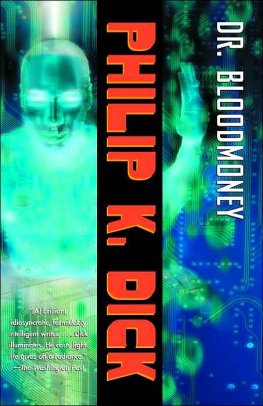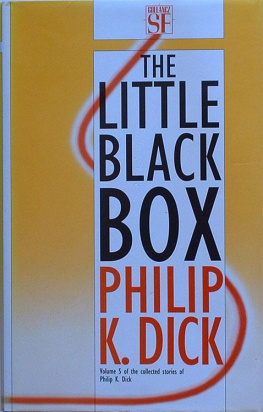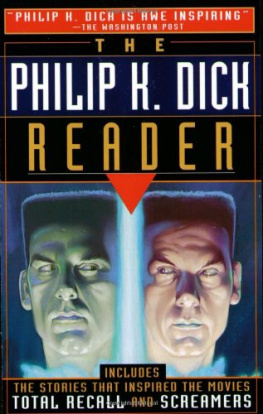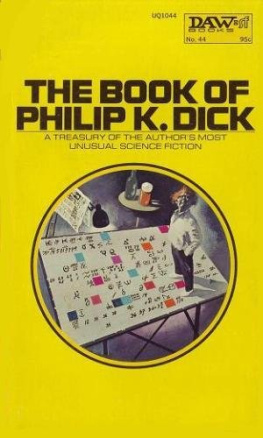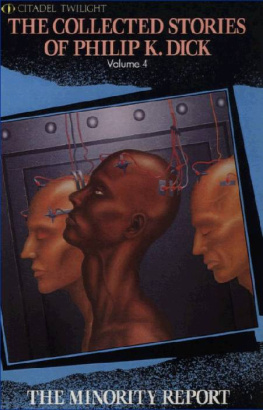Philip Dick - The Shifting Realities of PK Dick
Here you can read online Philip Dick - The Shifting Realities of PK Dick full text of the book (entire story) in english for free. Download pdf and epub, get meaning, cover and reviews about this ebook. genre: Science fiction. Description of the work, (preface) as well as reviews are available. Best literature library LitArk.com created for fans of good reading and offers a wide selection of genres:
Romance novel
Science fiction
Adventure
Detective
Science
History
Home and family
Prose
Art
Politics
Computer
Non-fiction
Religion
Business
Children
Humor
Choose a favorite category and find really read worthwhile books. Enjoy immersion in the world of imagination, feel the emotions of the characters or learn something new for yourself, make an fascinating discovery.

- Book:The Shifting Realities of PK Dick
- Author:
- Genre:
- Rating:5 / 5
- Favourites:Add to favourites
- Your mark:
- 100
- 1
- 2
- 3
- 4
- 5
The Shifting Realities of PK Dick: summary, description and annotation
We offer to read an annotation, description, summary or preface (depends on what the author of the book "The Shifting Realities of PK Dick" wrote himself). If you haven't found the necessary information about the book — write in the comments, we will try to find it.
The Shifting Realities of PK Dick — read online for free the complete book (whole text) full work
Below is the text of the book, divided by pages. System saving the place of the last page read, allows you to conveniently read the book "The Shifting Realities of PK Dick" online for free, without having to search again every time where you left off. Put a bookmark, and you can go to the page where you finished reading at any time.
Font size:
Interval:
Bookmark:
Dick, Philip
The Shifting Realities of PK Dick
Edited and with an Introduction by Lawrence Sutin
Copyright 1995 - First Vintage Books Edition
ISBN 0-679-42644-2
"A wide-ranging selection of free-wheeling philosophical essays and journal entries; humorous, thoughtful speeches; and plot scenarios... . For both casual and serious Dick fans, The Shifting Realities unearths some gems." -- Boston Phoenix
Philip K. Dick was both our most brilliant science fiction writer and a visionary philosopher who chose to couch his speculations in fiction. For, as he wrote about androids and virtual reality, schizophrenic prophets and amnesiac gods, Dick was also posing fundamental questions: What is reality? What is sanity? And what is human? This unprecedented collection of Dick's literary and philosophical writings acquaints us with the astonishing range and eloquence of his lifelong inquiry.
The Shifting Realities of Philip K. Dick includes autobiography, critiques of science fiction, and dizzyingly provocative essays such as "The Android and the Human" and "It You Find This World Bad, You Should See Some of the Others." Readers will also find two chapters of a proposed sequel to Dick's award-winning novel The Man in the High Castle and selections from the metaphysical Exegesis that inspired his classic VALIS.
Witty, erudite, and exploding with intellectual shrapnel, this is the last testament of an American original. This collection confirms Dick's reputation as one of the foremost imaginative thinkers of the twentieth century.
To Mab, for her ceaseless fascination and patience with Philip K. Dick, and to Henry, always the most attentive reader of the Exegesis.
The editor would also like to thank Douglas A. Mackey for his kind assistance in tracing prior publication data for certain of the writings inluded herein.
Introduction
BY LAWRENCE SUTIN
This is a first-time collection, in book form, of significant nonfiction writings -- essays, journals, plot scenarios, speeches, and interviews -- by Philip K. Dick from throughout his career. These writings establish, I believe, that Dick was not only a visionary creator of speculative fiction but also an illuminating and original thinker on issues ranging from the merging of quantum physics and metaphysics; to the potential scope of virtual reality and its unforeseen personal and political consequences; to the discomforting relation between schizophrenia (and other psychiatric diagnoses) and societal "joint hallucinations"; to, not least, the challenge to primary human values posed in an age of technological distance and spiritual despair.
The bulk of these writings have either never before been published, or have appeared only in obscure and out-of-print publications. Dick saw himself first and foremost as a fiction writer, and there can be no question that it is in his stories and his novels -- both science fiction (SF) and mainstream -- that Dick's most permanent legacy resides. As for his nonfiction writings, those few essays and speeches that he published in his lifetime attracted scant attention. In certain cases, this was justified -- their style and quality were markedly uneven; indeed, the same may be said with respect to the contents of this volume, many of which -- the Exegesis entries -- Dick had no intention of publishing in his lifetime and hence no reason to revise and polish. (He may -- there is no direct evidence in his private writings to support the supposition -- have hoped that they be discovered and published after his death.)
But the lack of attention paid to Dick's nonfictional works is due to factors that go beyond unevenness of quality. To this day one finds, in SF critical circles, sharp resistance to the notion that Dick's ideas -- divorced from the immediate entertainment context of his fiction -- could possibly be worthy of serious consideration. It is as if, for these critics, to declare that certain of Dick's ideas make serious sense is to diminish his importance as the ultimate "mad" SF genius -- a patronizing role assigned him by these selfsame critics. But it is nonsensical to maintain, in the face of the plain evidence of the fictional texts themselves, not to mention his own writings on SF in this volume, that Dick's ideas and his fictional realms are divisible dualities rather than the permeable whole of a life's work. Thankfully, this kind of critical parochialism is diminishing even within the SF world. And as for the world at large, Dick is, at long last, receiving his due as a writer of both imaginative depth and intellectual power. Indeed, the story of his emergence into sudden literary "respectability" is a revelatory parable as to the fierce cultural strictures that, in America, dominate the type and degree of attention paid to an author and his works.
Philip K. Dick (1928-82), author of more than fifty volumes of novels and stories, has become, since his death, the focus of one of the most remarkable literary reappraisals of modern times. From his longtime status as a patronized "pulp" writer of "trashy" science fiction, Dick has now emerged -- in the minds of a broad range of critics and fellow artists -- as one of the most unique and visionary talents in the history of American literature.
This astonishing turnabout in recognition of Dick is evidenced both by the intensity of the praise bestowed on him and the range of voices that concur in it. Art Spiegelman, author/illustrator of Maus, has written: "What Franz Kafka was to the first half of the twentieth century, Philip K. Dick is to the second half." Ursula Le Guin, who has acknowledged Dick's strong influence on her own acclaimed SF novels, points to him as "our own homegrown Borges." Timothy Leary hails Dick as "a major twenty-first-century writer, a 'fictional philosopher' of the quantum age." Jean Baudrillard, a leader of the postmodernist critical movement in France, cites Dick as one of the greatest experimental writers of our era. New Age thinker Terrence McKenna writes of Dick the philosopher as "this incredible genius, this gentle, long-suffering, beauty-worshiping man." Dick appears on the cover of The New Republic while the critical essay within declares that "Dick's novels demand attention... . He is both lucid and strange, practical and paranoid." An electronic-music opera with a libretto based on the Dick novel Valis premieres to great acclaim in the Pompidou Center in Paris. The renowned Mabou Mines theater group performs a dramatic adaptation of the Dick novel Flow My Tears, the Policeman Said in Boston and New York. Punk and industrial rock bands take their names from Dick titles and pay homage to his books in their lyrics. Hollywood adapts a Dick novel (Do Androids Dream of Electric Sheep?) and a story ("I Can Remember It for You Wholesale") into the movies Blade Runner and Total Recall, while an acclaimed French film adaptation of yet another novel (Confessions of a Crap-Artist) was released in America in the summer of 1993 under the title Barjo. In the past two years, Dick has been the subject of laudatory front-page features in The New York Times Book Review and the L.A. Weekly -- the opposite poles, one might say, of an overall mainstream acceptance. The headline for the L.A. Weekly feature sums up the thrust of the critical turnaround: "The Novelist of the '90s Has Been Dead Eight Years."
What makes this posthumous triumph all the more wrenching is the knowledge that, during his lifetime, Dick could succeed in reaching a wide readership only within the "ghetto" of the (SF) genre -- a critically derided "ghetto" that effectively prevented serious consideration of his works from without. Dick wrote a number of mainstream literary novels (including the above-mentioned
Font size:
Interval:
Bookmark:
Similar books «The Shifting Realities of PK Dick»
Look at similar books to The Shifting Realities of PK Dick. We have selected literature similar in name and meaning in the hope of providing readers with more options to find new, interesting, not yet read works.
Discussion, reviews of the book The Shifting Realities of PK Dick and just readers' own opinions. Leave your comments, write what you think about the work, its meaning or the main characters. Specify what exactly you liked and what you didn't like, and why you think so.


